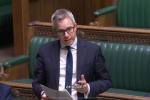
A new strategy to ensure England’s pubs, bars, restaurants and other hospitality venues can thrive long-term and adapt to consumer demands has been launched by Business Minister Paul Scully.
The Hospitality Strategy focuses on reopening, recovery and resilience post-pandemic. It sets out a vision for the future of the sector, building on the unprecedented £352 billion package of support available throughout the pandemic, including the furlough scheme, loan guarantees and protection from commercial rent eviction and debt forfeitures, grants, business rates relief, a VAT cut on food and non-alcoholic beverages to 5% and the Eat Out to Help Out Scheme.
New measures will highlight hospitality opportunities to jobseekers through DWP’s dedicated work coaches and help the sector to address current recruitment challenges. It will also help the sector to return to profitability by working with the government-owned British Business Bank and directly with lenders to support access to finance for hospitality firms so they can invest in their businesses.
The Strategy will also make it easier for pubs, restaurants and cafes on the high street to offer al fresco dining and serve more customers outside, with pavement licenses being extended and made permanent. Takeaway pints will also continue for another 12 months as the temporary permissions for off-sales of alcohol are extended in England and Wales, boosting sales.
The government is setting out ways to help the sector improve its resilience, including by making hospitality a career option of choice, boosting creativity, and developing a greener sector. The strategy sets out measure that include:
- exploring options for vocational skills and training to support careers in the sector, including apprenticeships, bootcamps and other qualifications like a T-Level, and working with the sector to raise the profile of careers in hospitality;
- supporting innovation and productivity by using the government’s Help to Grow programmes to strengthen the sector’s digital and management skills, and bringing hospitality businesses together with universities and other innovators to support the next generation of hospitality start-ups; and
- helping the sector reduce emissions, including by cutting waste and single-use plastic consumption;
- a new Community Ownership Fund worth £150 million fund to give people across the UK the chance to run local pubs at risk of closure as community-owned businesses; and
- a new Hospitality Sector Council made up of industry leaders and government to oversee the delivery of the strategy.
The Hospitality Sector Council will agree an action plan to deliver the recommendations, review progress against this plan and monitor the overall recovery of the sector as businesses transition from reopening to recovery to resilience. The Council will be co-chaired by Business Minister Paul Scully and hospitality entrepreneur Karen Jones and further members will be announced in due course.
High Streets Strategy
The recent publication of the High Streets Strategy and Tourism Strategy underlines that a thriving hospitality sector supports tourism and high streets and vice-versa - these strategies work together to deliver an even greater impact for businesses and workers.
Among other measures supporting the hospitality sector, the High Streets Strategy includes a commitment to work with local authorities and the sector to develop a model for hospitality-led regeneration hubs across each nation of the UK.
Last month, the government extended its measures protecting commercial tenants from eviction to March 2022 and announced that legislation will be introduced to help resolve commercial rent debts resulting from COVID-19 business closures.


